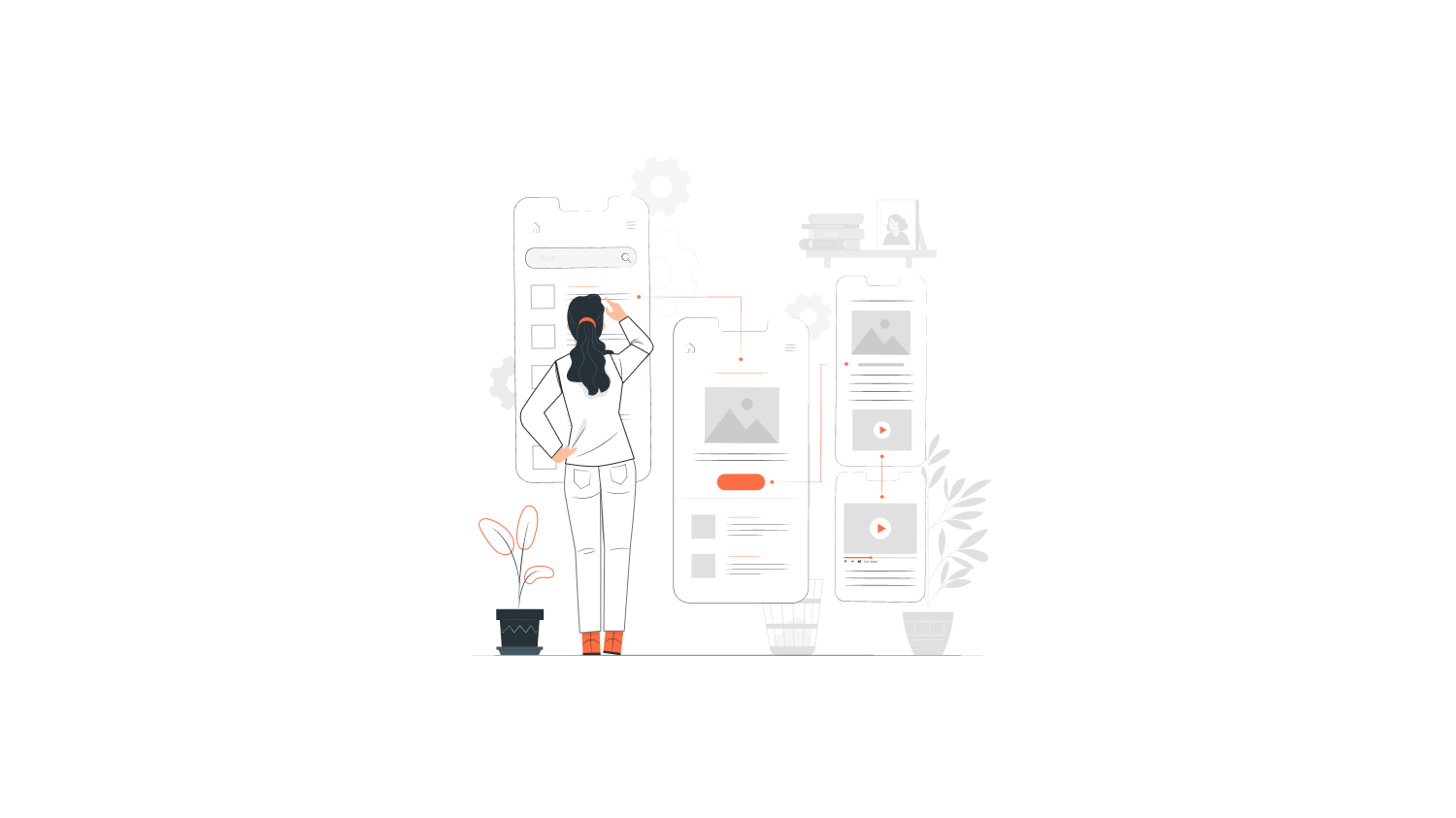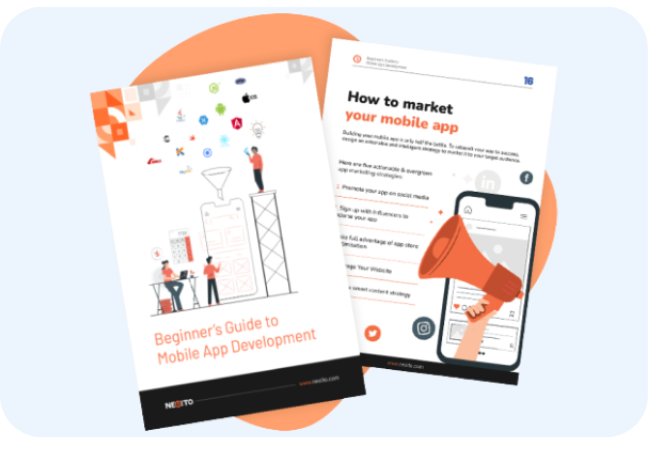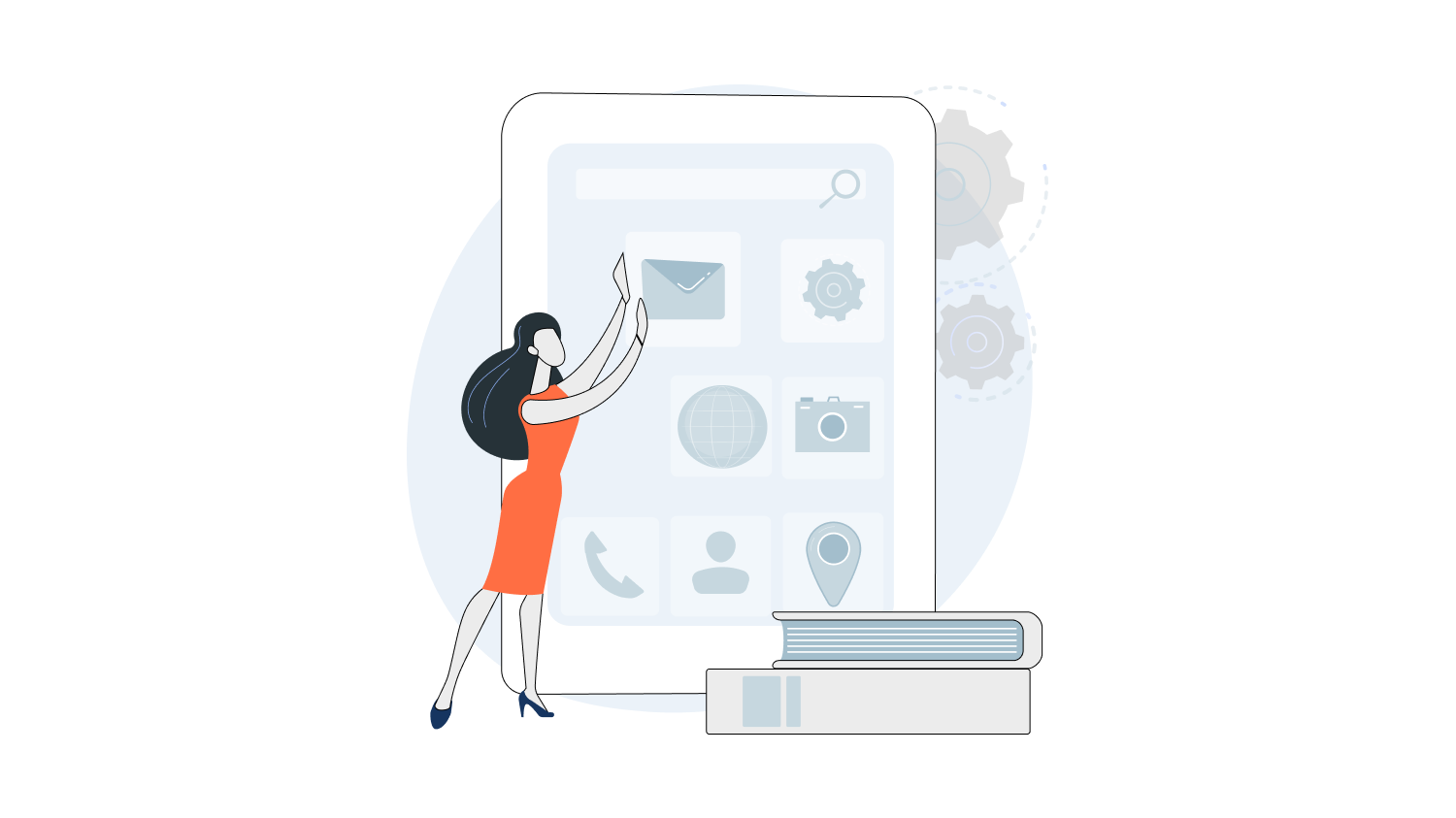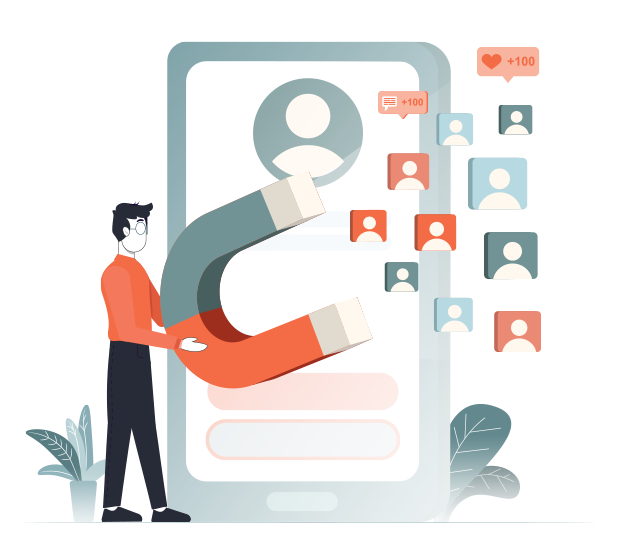Did you know?
The market size of mobile enterprise apps is expected to hit $262.52 billion in 2028; the CAGR is growing at 15.2% from 2021 to 2028.
Like how individual mobile app usage is increasing, enterprises app usage is also on the rise as businesses want to offer an optimised employee experience.
Many enterprises need custom-made mobile apps to accomplish their business goals faster.
Enterprise mobile app development is very different from usual mobile apps. It needs a lot of different features, custom-made specifications, increased security and more.
In this blog, you’ll learn how to create a mobile enterprise app from scratch, its cost and benefits.
Let’s get started.
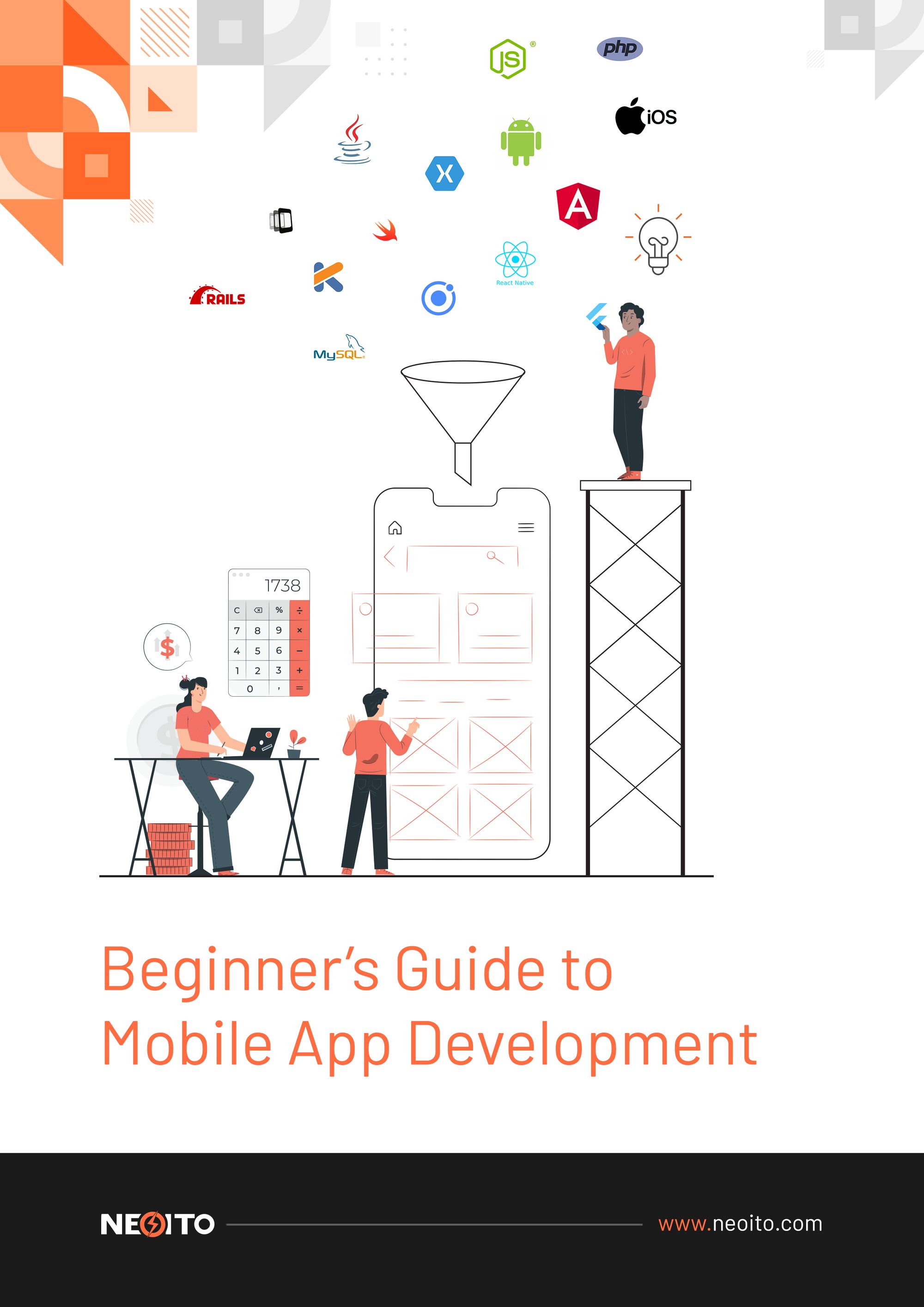
Free Download
A Complete Guide to Mobile App Development
What is an enterprise mobile application?
An enterprise mobile app is a mobile application dedicated entirely to an enterprise. Unlike regular apps, the user base of an enterprise mobile application is limited to employees and employers. That is, you cannot use an enterprise app of a business like you use your social media apps.
An enterprise app will effectively increase engagement between different business divisions operating within an organisation. Enterprise can create apps for both internal and external usage.
The sole purpose of developing a mobile enterprise app is to solve the pain points faced by the employer in various aspects of the business. Automating repetitive tasks and workflow is not going to be easy.
It needs a lot of data gathering and understanding to create better apps. Once the app is ready, you can make changes to it in the future to make it work effectively.
Types of enterprise applications
Based on the requirements of an enterprise, there are three common types of enterprise applications.
1. Employee level
This is the basic need for an enterprise to handle communication between employees and managing the workflow effectively.
This type of application has fewer features but helps managers or team leads handle the day-to-day tasks effectively. It provides regular updates on your projects and drives better communication with team members.
2. Department level
Department level apps are entirely dedicated apps to a department working in an organsiation. This type of app comes in handy for the in-house marketing and sales department of your enterprise.
Along with optimisation, the team can be directly connected to the customers to get easy feedback and results.
Examples of these types of apps are CRM apps.
3. Company level
Company level apps connect all the departments and employees of a business. Developing a full-fledged company level app requires a lot of effort as it contains several unique features.
This type of app will give access to better communication between employees and also provide access to internal information or files depending on the access level.
Benefits of using an enterprise mobile app
The main purpose of developing an enterprise mobile app is to digitalise and optimise your business process. There are also numerous benefits for a business organisation when they leverage enterprise mobile apps. They are:
- Managing and optimising day-to-day operations
- Growth in overall revenue
- Boosted productivity
- Automating almost all the payment needs of the organisation, which cuts out late payments, delays in invoicing and more.
- Automating repetitive tasks
- Efficient supply chain control.
- Smooth onboarding of employees
- Leverage the most out of the data stored by using enterprise mobile apps
- Improved customer support and faster remedies
- Easy monitoring of employees and work progress
- Highly optimised user experience
- Will provide faster access to the tech team in emergencies
- Minimises the cost of operations
Things to note before starting enterprise mobile app development
Before starting the enterprise mobile app development process, you need to consider the below factors to avoid potholes in the long run.
Business objectives
- Why are you developing the product?
- What are the pain points you’re going to address?
- Who is going to use your product?
- Does your product align with your business objectives?
Once you have a clear answer, you can start thinking about the features of your app.
Smooth integration
You’re already following a process in your enterprise business. So the app needs to be easily integrated with the ongoing operation without any friction.
Remember: The ultimate objective of your app is to make things easier for you; not the other way around.
It is essential to have flexible APIs that will go easy with third-party app integration.
For example, some CRM services like HubSpot are used by many organisations. So when you build an enterprise mobile app, it has to be easily integrated with these apps to avoid breaking the workflow.
Security
When you develop an enterprise mobile app, there are more possibilities for using the app on personal devices. This may considerably increase the risk of a data breach.
So prioritise the security features. It will be a good idea to create a security checklist before developing your app.
For example, apart from setting passwords, you may need to enable two-factor authentication to strengthen the security of your app.
Administration
Enterprise mobile app development is an arduous task.
Other than the app development team, you need to comply with many legal and departmental policies. So before you start developing, choose an expert team to handle those aspects.
Also, it is crucial to train your employees on how to use the enterprise mobile app.
Also Read: A Step-by-Step Guide to Building Your First Mobile App
Common Features in Enterprise Mobile Apps
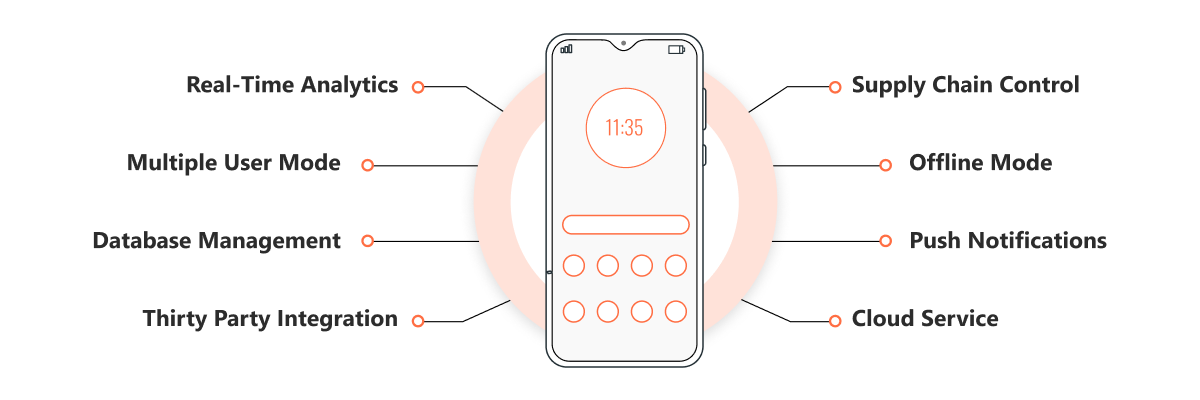
There is no one absolute list of features for the enterprise app; the features depend on your requirements. We have listed some of the standard features that every app needs regardless of the requirements such as
- Comprehensive database management
- Multiple users model – not all features are accessible to all employees, so they need different user levels
- Third-party app integration
- Providing real-time analytics
- Instant and direct or group messaging between employees
- Supply chain control
- Improved cloud storage
- Enhanced user experience
- Data sharing
- Offline mode
- Push notifications
Enterprise Mobile App Development Stages
When you look, the enterprise app development process seems very complex; yeah, it is. But it will be smooth progress with the right strategy and efficient planning.
It is impossible to develop a mobile app at the early stage; you must cross a lot of preplanning and post-planning to achieve it.
Let’s brace ourselves for action; here we start.
Read | A Step-by-Step Guide to Mobile App Development Process: Learn what it takes to build a full-fledged mobile app faster to grow your business.
Research
Your software project starts with research. Market research is the best way to understand how your app is going to work.
You should know what the pain points the app will solve. To understand it, you must understand:
- Existing operational process
- Market segments
- Customer behaviour pattern
- Understanding business goals
- Customer cycle
While understanding all of those, you need to list out the essential features needed. At this stage, note the important features and specifications to be considered before designing or developing your app.
UI/UX design
Once you know what you will develop, we dive into the design process.
Design plays a crucial role in all software development. If you have flaws in the design, it will never be easy to use and cause friction in your user experience.
UI/UX designers will work and show how the app works and the user experience look.
The result will be like a mockup, a prototype or a video which explains how the app works.
While designing, you need to consider the app for cross-platform building. You need to develop a basic model for all the widely used platforms, like Play Store, Appstore, Windows and more.
Choosing the platform
Before you start coding, you need to finalise the platform of your app. Many software technologies are available; before choosing the language, you must be clear about the cross-platform apps.
If you plan on launching cross-platform apps, you must choose the language accordingly.
There are languages like Flutter, which will need single coding to develop cross-platform apps.
Due to many features in the mobile enterprise apps, Progressive Mobile Apps (PWA) are getting more popular. PWA is basically a website that works in a browser but acts like a mobile application with many elements for an optimised user experience.
Product development
Product development works at two levels:
- Front-end development
- Back-end development
Front-end development
Front-end development is the side where the user interacts with the app. There are many platforms like Java, and Kotlin is used to build the front-end development of enterprise mobile apps.
Back-end development
The back-end is where the data is stored and all the other behind-the-scene actions of your app take place. A user cannot access the back-end. Your tech team handles it.
Also Read: Complete Product Development Process Startup Founders Need to Know
Testing
When developing a software product, you must ensure it works well before releasing it. Testing plays a crucial role in security, user interface and the progress of the app in the future.
Different testing types are available to ensure your app is ready to release. The list of testing for better quality involves:
- Security testing
- Performance testing
- Usability testing
- Installation testing
- Localisation testing
- Compatibility testing
- Manual testing
Support and maintenance
All software project needs proper maintenance and regular updates for smooth running and results. As enterprise changes according to the trend, you must customise your app regularly to give a better user experience.
So when you choose to develop a product, you lock yourself with proper maintenance and updates.
Cost to Develop an Enterprise Mobile App
Many factors determine the cost of enterprise mobile app development. One important factor is the way you are going to develop your app.
There are three ways to create a mobile app:
- Build your own software development team
- Hire freelancers for development and designing
- Outsource your development process to a product development company
All three ways have their advantages and disadvantages.
The features of your app and the team you hire impact your development cost.
Suggested Read: What’s the Average App Development Cost : Learn how much you will need to spend to build a high-performing app in 2023.
Trends to Watch in Enterprise Mobile App Development in 2023
As the technology is emerging fast, many new trending technologies are evolving in the enterprise’s mobile apps.
Some of the technologies to watch in 2023 are:
- Implementing Artificial Intelligence and Machine Learning
- Including the Internet of Things (IoT)
- 5G
- Blockchain
Takeaway
The enterprise mobile apps can drastically improve your team’s performance and productivity while reducing your day-to-day costs. While creating an enterprise mobile app may seem like a daunting task, you can easily pull it off with the help of a highly proficient tech team.
If you are still confused or not confident about it, you can rely on a reliable mobile app development company that can take over your project from scratch to maintenance.
Planning on developing an enterprise mobile app for your organisation? Get a free consultation from our mobile app experts now.
A mobile app which is completely dedicated to providing solutions for an enterprise. The most users of this app are employees of an organisation. The development of this kind of app is called enterprise mobile app development.
The cost to build an enterprise app will mostly be based on the features required and complications of the features
The applications used in organisations for email automation, payroll management, and CRMs come under enterprise applications.
In enterprise mobile applications, security will be the most important priority. As there will lot of confidential data shared among the employees, it is important to secure it with different levels of authorisation.
The difference is that web applications are used by individuals and enterprise apps are used by the government or business organisations. Web apps are a single page of applications, but enterprise apps are a suite of applications.
